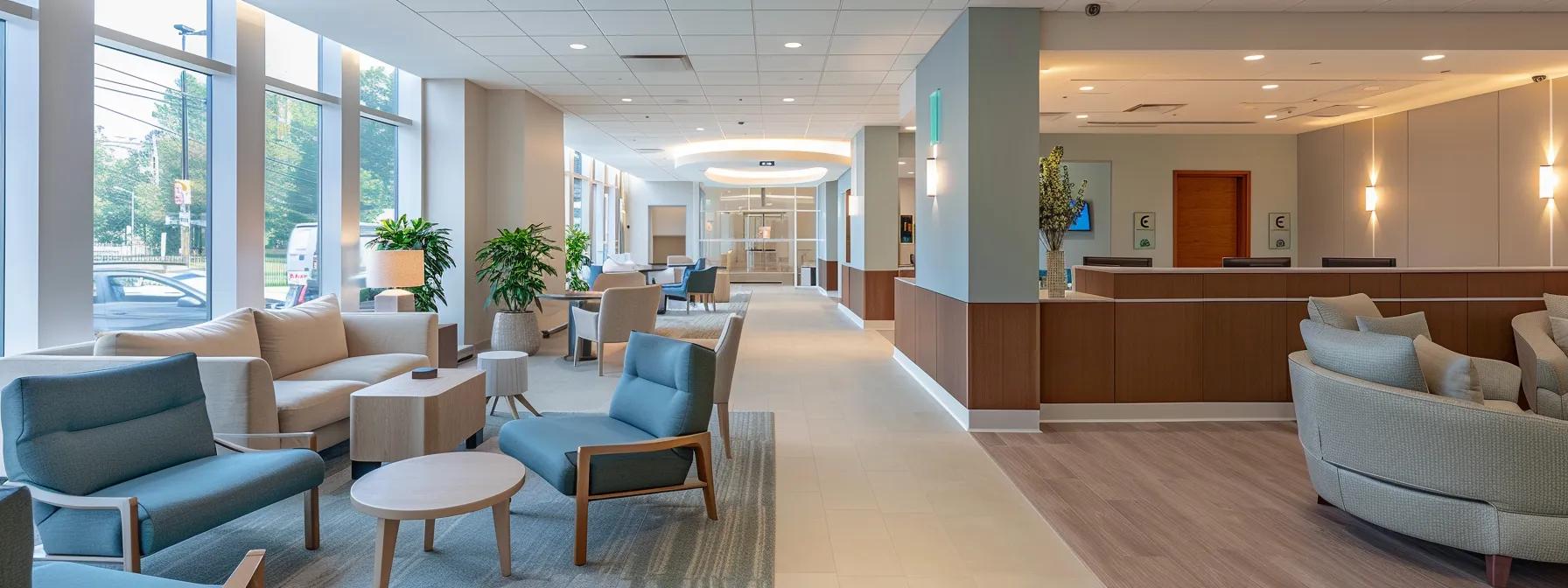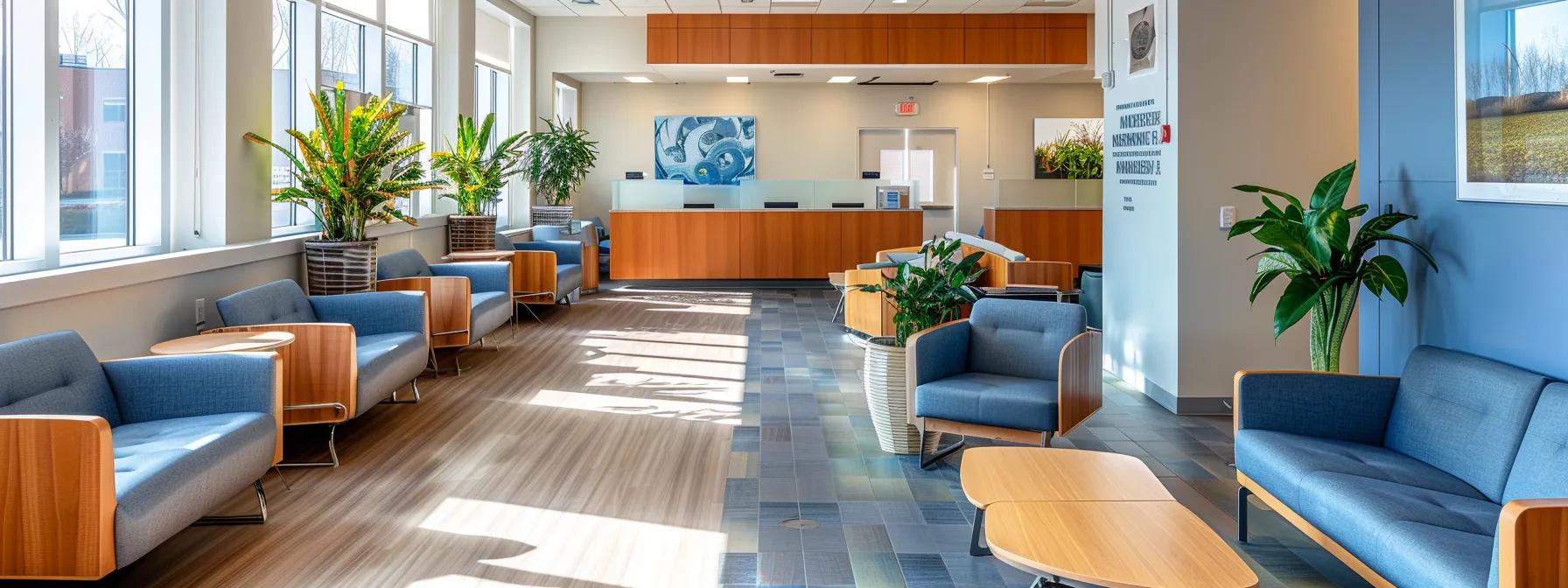Table Of Contents:
- How to Choose the Right Rehab Center in Massachusetts
- Define Your Specific Recovery Needs Before Selecting a Massachusetts Rehab
- Surveying Various Addiction Rehabilitation Facilities Massachusetts Offers
- Verify Credentials and Quality Markers of Massachusetts Rehab Centers
- Examine Treatment Philosophies and Therapeutic Approaches at Massachusetts Facilities
- Address Practical Aspects When Selecting Addiction Rehabilitation Facilities Massachusetts
- Plan for Sustained Recovery With Aftercare Services From Massachusetts Rehabs
- Frequently Asked Questions
- Frequently Asked Questions
How to Choose the Right Rehab Center in Massachusetts
In the pursuit of treatment recovery from substance use disorders, selecting the right rehabilitation center is a critical decision that can dramatically affect both recovery and long-term sobriety. Families and patients often face many questions when choosing among facilities and are encouraged to findyourstrength when navigating their options. Key factors such as treatment philosophy, accreditation, cost, support systems, and individual needs play essential roles. For those seeking help in Massachusetts, understanding the different care levels—from inpatient to outpatient, dual diagnosis to specialized aftercare—is crucial for a comprehensive treatment recovery. This guide is structured with clear headings that address recovery needs, facility comparisons, credentials, treatment philosophies, practical aspects, and aftercare planning. By examining these considerations, facilities like Strength Recovery Center in Weymouth and other quality centers across the state are presented as pivotal allies in achieving lasting sobriety.
With over 2000 words of detailed analysis and practical advice, every section begins by answering common queries and is supported with examples and explanations. Whether dealing with alcohol, prescription drugs, or opioid dependence, the sections below outline the steps necessary to choose a facility that offers the optimal recovery environment. The guide is segmented into key areas that maintain the original heading structure and provide targeted answers regarding treatment needs, facility offerings, quality markers, therapeutic approaches, practical issues, and aftercare services. This comprehensive approach helps reduce the stress of decision-making and empowers patients to choose options addressing both immediate detox and long-term independence, wellness, and relapse prevention.
Transitioning into the main content, each section below details important aspects for selecting an appropriate rehab center in Massachusetts.
Define Your Specific Recovery Needs Before Selecting a Massachusetts Rehab
Understanding personal recovery needs is the first step in choosing a rehab center in Massachusetts. An honest self-assessment sets the stage for a positive journey and helps match individual circumstances with available services.
Assess the Type and Severity of Substance Use
Determining the appropriate level of care begins with evaluating the type and severity of substance use. Consider whether use is occasional or chronic, and if there have been major health or behavioral changes. Severe cases may require intensive inpatient treatment, while moderate cases might be managed with outpatient programs. Clinical assessments—including frequency of use, physical dependency, and withdrawal symptoms—help guide treatment decisions. For example, patients with opioid use disorder often experience significant withdrawal, necessitating medical detoxification. Professionals specializing in substance dependence can advise whether medication-assisted therapy (MAT) should accompany behavioral interventions like cognitive behavioral therapy (CBT) or dialectical behavioral therapy (DBT). Assessments also consider co-occurring disorders to ensure the facility can handle both detox and subsequent treatment.
Identify Any Co-Occurring Mental Health Conditions for Dual Diagnosis Consideration
Many individuals with substance use disorders also experience mental health challenges such as depression, anxiety, bipolar disorder, or trauma. Dual diagnosis treatment requires an integrated approach to address both mental health issues and substance abuse concurrently. Facilities providing dual diagnosis care combine traditional therapies with psychiatric evaluations, counseling, and sometimes medication management. For example, treatment plans might include trauma-focused therapy or mindfulness practices along with relapse prevention strategies. Recognizing these challenges and confirming that the center is equipped to handle them is essential for an efficient recovery process.
Clarify Your Personal Preferences for a Treatment Environment
A tailored treatment plan starts with understanding your preferences in a rehab in Massachusetts environment. Some patients thrive in very structured, residential settings with 24/7 care, while others prefer the independence of outpatient programs. Factors such as ambiance, facility design, patient-to-staff ratio, and availability of outdoor activities impact recovery outcomes. Consider whether you are more comfortable in group settings or prefer individualized counseling, and if any specific accommodations are necessary. Researching testimonials and reviews regarding the facility’s environment and staff support can help determine if it fits your lifestyle and recovery goals.
Determine Your Available Support Systems
Recovery is best supported by a strong network. Identify available support systems from family, friends, or community groups, including peer support networks and alumni groups affiliated with rehab centers in Massachusetts. A robust support network offers both moral and practical assistance during early recovery phases. Discussing these supports with potential treatment providers can help align aftercare plans. Facilities that encourage family involvement and offer resources for building strong support networks tend to have better long-term outcomes.
Set Clear Goals for Your Addiction Treatment Journey
Setting clear, achievable goals is crucial for mapping your recovery journey. Goals may include immediate objectives like detoxification and stabilization, followed by long-term aims such as rebuilding relationships, restoring routines, or pursuing educational or professional milestones. Well-defined goals provide benchmarks for tracking progress and help maintain motivation. Reputable centers work with patients to create personalized recovery plans detailing measurable outcomes—such as reduced substance cravings and improved cognitive functioning—which enable adjustments to treatment strategies over time.
Surveying Various Addiction Rehabilitation Facilities Massachusetts Offers

Massachusetts offers a variety of addiction rehabilitation facilities with differing treatment models, program lengths, and support services. Prospective patients should survey these facilities to compare care types and additional offerings. The sections below outline available care models—from inpatient to outpatient—and offer insights into which options may best suit different addiction severities and personal needs.
Understanding Inpatient and Residential Treatment Programs in Massachusetts
Inpatient or residential treatment programs provide a structured, immersive recovery experience. Patients remain at the facility full-time, benefiting from constant supervision, round-the-clock medical support, and a consistent schedule of therapeutic activities. These programs are particularly beneficial for patients with severe substance dependencies who are at higher risk of relapse outside controlled environments. Inpatient settings typically include detoxification followed by a combination of group and individual therapies. Many residential centers also integrate aftercare planning to ensure a smooth transition back into daily life. The controlled environment reduces exposure to triggers and offers intensive support from a multidisciplinary team, often resulting in higher success rates.
Reviewing Outpatient Program Structures and Flexibility
Outpatient programs offer a balance between professional care and maintaining everyday life. They are less restrictive than inpatient programs, allowing patients to live at home while receiving treatment and support. These programs are ideal for cases where substance use is less severe or when a strong external support system exists. Outpatient services typically include regular therapy sessions, support groups, and periodic counseling. While the flexible schedule enables patients to manage work or family commitments concurrently, the less controlled setting may expose them to more triggers. The success of outpatient treatment depends on the patient’s ability to manage responsibilities and adhere to therapy protocols.
Investigating Medical Detoxification Services and Protocols
Medical detoxification is often the first step in treatment, especially for patients undergoing withdrawal from substances that cause severe symptoms. Massachusetts rehab centers in Massachusetts typically follow strict detox protocols that include medical supervision, administration of withdrawal medications, and constant monitoring of vital signs. Evaluating a facility’s detox process involves reviewing the qualifications of the medical staff and the standards they employ. Centers that use board-certified addiction specialists and credentialed nursing staff can minimize complications and improve safety. Transparent communication about detox procedures and treatment duration is key when choosing a facility.
Learning About Partial Hospitalization Programs (PHP) in Massachusetts
Partial Hospitalization Programs (PHP) offer an intermediate level of care that combines the intensity of inpatient treatment with the flexibility of outpatient services. PHPs provide daily therapeutic interventions without requiring an overnight stay. These programs often involve intensive therapy sessions, medication management, and comprehensive counseling throughout the day, making them suitable for patients who need structured care but do not require 24/7 supervision. PHPs are especially effective for those transitioning from inpatient care or who have obligations that preclude full residential treatment.
Exploring Intensive Outpatient Programs (IOP) as a Treatment Option
Intensive Outpatient Programs (IOP) are designed for patients who need ongoing support while maintaining their daily routines. IOPs typically require treatment several times per week and include both individual and group therapy. These programs focus on reinforcing coping strategies, relapse prevention techniques, and continuous communication with therapists and peers. IOPs may also incorporate holistic care elements such as stress management, meditation, and physical fitness. Their flexibility makes them suitable for individuals balancing work or family responsibilities, while still ensuring intensive therapeutic support.
Verify Credentials and Quality Markers of Massachusetts Rehab Center in Massachusetts
Ensuring that a rehab center meets high standards of safety and efficacy is vital. Prospective patients must verify credentials and quality markers before choosing a facility.
Confirm State Licensing and National Accreditation Status
The first step is to confirm that the rehab center holds proper state licensing and national accreditation. Licensed facilities comply with regulations that ensure safety and treatment integrity, while national accreditation from agencies like the Commission on Accreditation of Rehabilitation Facilities (CARF) or The Joint Commission indicates adherence to high quality standards. Prospective patients should request copies of licenses and accreditation certificates and review any compliance reports. Accredited centers often publish success rates and clinical outcomes, providing tangible metrics of performance.
Inquire About the Qualifications and Specializations of Clinical Staff
The expertise of the clinical staff is paramount. Patients should ask about the qualifications of therapists, counselors, psychiatrists, and support staff involved in treatment. Key questions include whether team members are board-certified in addiction medicine or mental health and their areas of specialization—particularly in treating co-occurring disorders. Facilities that invest in ongoing staff training and adopt multidisciplinary approaches tend to deliver more effective, up-to-date care.
Seek Information on Evidence-Based Treatment Methodologies Utilized
Reputable centers employ evidence-based treatment methodologies grounded in scientific research. Common approaches include Cognitive Behavioral Therapy (CBT), Dialectical Behavioral Therapy (DBT), and motivational enhancement therapy, sometimes supplemented with medication-assisted treatments (MAT). Patients should inquire about the specific therapies used and request information on clinical outcomes such as retention rates and improvements in substance cravings. This data helps assess the reliability of the treatment methodologies.
Ask About Program Duration and Success Indicators if Available
A clear understanding of program duration and success indicators is important. Each rehab center in Massachusetts will have prescribed treatment lengths for options such as PHP, IOP, or residential care, along with success metrics like improved daily functioning and reduced relapse rates. Asking for details about evaluation methods and outcome statistics can provide confidence in the program’s ability to deliver lasting results.
Read Reviews and Testimonials From Former Patients and Families
Direct feedback from former patients and their families can offer invaluable insights into a rehab center’s performance. Reviews and testimonials provide context regarding the treatment environment, staff professionalism, and overall effectiveness. These firsthand accounts help verify that the clinical data matches real-world experiences.
Examine Treatment Philosophies and Therapeutic Approaches at Massachusetts Facilities

The treatment philosophy and therapeutic approaches of a facility significantly impact recovery outcomes. Massachusetts rehab center in Massachusetts use various techniques to address both physical and psychological aspects of addiction.
Compare Different Therapeutic Modalities Like CBT and DBT
Therapeutic modalities such as CBT and DBT are widely used in addiction treatment. CBT targets negative thought patterns and behaviors, while DBT integrates mindfulness and stress management to help with emotional dysregulation. Patients should consider how each approach may benefit their specific circumstances. Many facilities detail how these methods are combined in both individual and group therapy settings, allowing patients to choose the approach most suited to their needs.
Ascertain Availability of Individual, Group, and Family Therapy Sessions
A comprehensive treatment plan includes a mix of individual, group, and family therapy sessions. Individual therapy allows for personalized attention, while group sessions foster peer support and shared experiences. Family therapy helps repair relationships and build a supportive home environment post-treatment. In Massachusetts, many centers offer diverse therapy options, and asking about session frequency and structure can provide insight into the overall treatment strategy.
Check for Medication-Assisted Treatment (MAT) Options if Appropriate
For patients with severe substance dependence, particularly opioid use disorder, Medication-Assisted Treatment (MAT) can be crucial. MAT uses medications such as methadone, buprenorphine, or naltrexone alongside counseling to reduce cravings and manage withdrawal. Patients should ask how MAT is integrated with other therapies and request information on monitoring protocols and outcomes. The availability of MAT may be a deciding factor for those with chronic substance use issues.
Look for Holistic or Complementary Therapy Offerings
Increasingly, rehab centers in Massachusetts incorporate holistic or complementary therapies—such as yoga, meditation, art therapy, equine-assisted therapy, and nutritional counseling—to enhance overall wellbeing. These therapies can help reduce stress, improve mood, and foster self-empowerment. They are especially valuable for patients who have struggled with traditional approaches alone. Evaluating the quality and integration of these adjunctive treatments can help determine if a facility offers a well-rounded recovery experience.
Understand the Facility’s Approach to Dual Diagnosis Treatment
For patients facing both substance abuse and mental health issues, a facility’s approach to dual diagnosis is critical. Dual diagnosis treatment means that both substance dependence and co-occurring mental health conditions are addressed simultaneously through coordinated care among psychiatrists, counselors, and other healthcare professionals. Understanding the center’s strategy for dual diagnosis ensures that treatment plans are equipped to handle complex clinical needs.
Address Practical Aspects When Selecting Addiction Rehabilitation Facilities Massachusetts
Beyond clinical effectiveness, practical issues such as location, cost, amenities, and policies are important in choosing a rehab center. Evaluating these aspects ensures that the facility meets everyday needs during recovery.
Evaluate the Location and Accessibility of Potential Centers
The geographic location of a rehab center influences a patient’s connection to support networks and ease of access. Patients should consider centers that are conveniently located—whether near home or in an area with good public transportation. The safety and accessibility of the surrounding neighborhood and availability of transportation services for appointments or group sessions are also important factors.
Understand the Full Costs, Accepted Insurance, and Payment Options
Financial considerations are key. Prospective patients must understand treatment fees, extra charges, and the acceptance of private health insurance, Medicaid, or other managed care plans. Researching fee structures, asking for cost breakdowns, and verifying any hidden fees helps ensure that financial stress does not hinder recovery.
Assess the Facility’s Environment, Amenities, and Comfort
The physical environment and amenities of a rehab center can impact treatment success. A clean, comfortable setting with quality living quarters, recreational areas, and dining options supports emotional well-being and recovery adherence. Virtual tours and reviews can help determine whether a facility’s environment is conducive to healing.
Inquire About the Typical Duration of Stay for Various Programs
Programs’ duration varies—from 30 to 90 days for inpatient care, to several months for outpatient services. Clear timelines help patients plan around personal and professional obligations and assess whether a program is intensive enough to prevent relapse and promote long-term sobriety.
Clarify Visitation Policies and Family Involvement Opportunities
Family involvement is a valuable part of recovery. Ask about the frequency of family visits, availability of family therapy sessions, and any support groups or educational programs for relatives. Facilities that promote active family participation generally report higher treatment success.
Plan for Sustained Recovery With Aftercare Services From Massachusetts Rehabs

Recovery extends beyond the initial treatment phase. Aftercare services—including relapse prevention, continued therapy, and alumni support networks—are essential for maintaining sobriety.
Investigate Available Aftercare Planning and Relapse Prevention Strategies
High-quality rehab centers provide detailed aftercare plans that include ongoing therapy sessions, support group meetings, and personalized relapse prevention tactics. These plans help patients manage triggers and stressors that might lead to relapse. Regular follow-ups and crisis intervention services are also typically part of comprehensive aftercare.
Inquire About Connections to Alumni Support Groups and Networks
Strong alumni networks offer ongoing community support and accountability. Many Massachusetts centers maintain connections through regular meet-ups, mentorship programs, and online forums. Positive feedback from previous patients regarding alumni support can be a good indicator of long-term recovery success.
Determine Options for Step-Down Care or Continued Therapy Post-Treatment
Step-down care helps patients transition from intensive treatment to independent living, gradually reducing therapy intensity while maintaining support. Ask about the duration and structure of these transition programs to ensure they provide sufficient follow-up support to prevent relapse.
Ask About Resources for Vocational or Educational Support
Reentering work, school, or community life is an important part of sustained recovery. Some rehab centers offer career counseling, vocational training, and educational workshops to help patients rebuild their lives and reduce anxiety about the future. These resources can be vital in establishing structured daily routines post-treatment.
Understand How the Center Supports Long-Term Sobriety Maintenance
Long-term recovery is supported by ongoing evaluations, booster therapy sessions, and modern relapse prevention tools. Many centers offer digital resources—such as mobile apps or online communities—that allow patients to track their progress and set continuing goals. Understanding these support systems provides confidence in the center’s commitment to long-term sobriety.
Frequently Asked Questions
Q: How do I know if an inpatient program is better than an outpatient program for my recovery needs?
A: Inpatient programs provide a highly structured, supervised environment that is beneficial for severe or chronic substance use disorders by isolating patients from triggers and offering intensive support. Outpatient programs, on the other hand, allow individuals to maintain daily responsibilities while undergoing treatment. The choice depends on addiction severity, co-occurring disorders, and available support systems. Consulting a healthcare professional can help determine the best option.
Q: What should I look for in a rehab center’s credentials to ensure quality care?
A: Look for state licensing and national accreditation from reputable bodies such as CARF or The Joint Commission, along with evidence of skilled clinical staff specializing in addiction treatment. Transparency in outcome data, patient testimonials, and success metrics like reduced relapse rates is also essential.
Q: Why is dual diagnosis treatment important in selecting a rehab center?
A: Many patients experiencing substance abuse also face mental health challenges. Dual diagnosis treatment addresses both issues concurrently, reducing the risk of relapse and improving overall outcomes by treating the entire person rather than just the addiction.
Q: How do aftercare services contribute to long-term sobriety?
A: Aftercare services, including ongoing therapy, relapse prevention strategies, and alumni support networks, provide continuous assistance after the initial treatment phase. They help patients manage triggers, maintain accountability, and smoothly transition back into normal life, which is critical for long-term success.
Q: Can family involvement and support enhance the effectiveness of addiction treatment?
A: Absolutely. Family involvement creates a supportive environment that can repair strained relationships and provide emotional reinforcement. Facilities that incorporate family therapy and structured visitation policies typically report better treatment outcomes and smoother transitions post-treatment.
| Aspect | Key Consideration | Benefit | Example |
|---|---|---|---|
| Licensing | State licensing and accreditation | Ensures quality care and adherence to standards | CARF accredited center |
| Clinical Staff | Qualifications and specializations | Guarantees effective treatment delivery | Board-certified addiction specialists |
| Therapeutic Modalities | Use of CBT, DBT, MAT | Evidence-based success in relapse prevention | Multiple therapy sessions weekly |
| Treatment Environment | Inpatient vs. outpatient | Matches personal needs and lifestyle | Residential treatment for severe cases |
| Program Duration | Length of treatment and step-down care | Provides clear timelines and expectation management | 30-90 days for inpatient care |
| Aftercare Services | Continued support and alumni networks | Reduces relapse rates and sustains recovery | Access to support groups post-treatment |
| Financial Transparency | Costs, insurance, and payment plans | Minimizes financial stress during recovery | Flexible payment options |
Before making a final decision, it is wise to review multiple centers, compare the features listed in the table above, and consider personal goals and lifestyle needs. A comprehensive evaluation ensures that the chosen rehab center delivers both immediate care and long-term support, which is vital for lasting sobriety.
| Treatment Type | Structure | Duration | Target Patients | Success Indicator | Amenities | Example Facility |
|---|---|---|---|---|---|---|
| Inpatient | 24/7 supervision, residential stay | 30-90 days | Severe dependency cases | Low relapse rates, high therapy adherence | Private rooms, integrated care | Strength Recovery Center |
| Outpatient | Session-based, home-supported | Several months | Mild to moderate cases | Steady progress, regular attendance | Flexible scheduling, peer groups | Local outpatient clinics |
| PHP | Day treatment without overnight stay | 4-6 hours/day, several weeks | Transition cases | Consistent progress, reduced withdrawal | Group and individual counseling | Accredited PHP centers |
| IOP | Intensive therapy sessions | 3-5 days/week | Working individuals | Improved coping and self-management | Virtual support, varied formats | Specialized IOP providers |
The table above summarizes key components of treatment modalities available in Massachusetts. Comparing these models side by side helps determine which structure best fits individual needs for an informed recovery strategy.
Overall, choosing the right rehab center means balancing clinical quality, treatment philosophies, practical factors, and aftercare support. A center that provides a personalized, evidence-based approach, experienced clinical staff, and comprehensive aftercare is best positioned to pave the way for a successful recovery journey.
Q: What factors should I consider when assessing my recovery needs?
A: Evaluate the type and severity of your substance use, any co-occurring mental health issues, and your personal preferences regarding treatment environments. Also, consider available support systems and set clear recovery goals. This thorough self-assessment helps you choose a center that meets your specific needs.
Q: How do I verify the credentials of a rehab center in Massachusetts?
A: Start by confirming that the center holds current state licenses and national accreditations (e.g., CARF). Review clinical staff qualifications and ask for transparent outcome metrics like success rates and patient testimonials to ensure quality care.
Q: Why is it important to understand the treatment philosophies of a rehab center?
A: Treatment philosophies—such as the use of CBT, DBT, and MAT—directly affect recovery outcomes. A center whose approach aligns with your personal needs can offer a tailored plan that addresses both the physical and psychological aspects of addiction.
Q: What role do practical aspects such as location and cost play in choosing a rehab center?
A: Practical factors impact comfort, accessibility, and the ability to manage treatment alongside daily commitments. A convenient location with transparent cost structures and flexible payment options reduces financial and logistical stress.
Q: How can aftercare services support long-term sobriety?
A: Aftercare services provide ongoing support—through continuous therapy, relapse prevention, and alumni networks—that help manage triggers and ensure a smoother transition back into daily life, contributing to long-term success.



